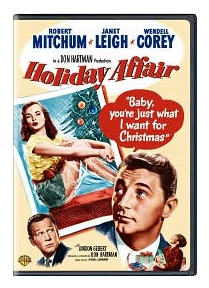Meal time and clean up had yielded to quiet time; company had headed home and my boys were off into the night to visit friends nearby.
 I settled in with 1949’s Holiday Affair, a simplistic romance between a war widow (Janet Leigh) and a sales clerk (Robert Mitchum).
I settled in with 1949’s Holiday Affair, a simplistic romance between a war widow (Janet Leigh) and a sales clerk (Robert Mitchum).
Sparks fly between these two over an electric train and a lost job, and decisions about whether or not to marry are clearly pitting love against pragmatism.
This is exactly the sort of movie that many grew up on – certainly my mother’s generation, sitting in the darkened playhouse and watching its theatrical release. And, thanks to television, I suppose my generation grew up on it as well, at least in part.
Its message? Relationships (and life goals) are reduced to Young Woman Seeking Job as Wife and Mother and, Man Seeking Good Homemaker.
If the woman has a child (as in this story), then she is likely a widow – the honorable reason for the end of marriage. This is one more reminder of the strange legacy of mid-century marital mores we still bear, some six decades later.
In this pleasant but formulaic plot, Leigh is the mother of a 6-year old boy who wants an electric train. She is courted by a well established attorney (Wendell Corey), but she doesn’t love him. He’s a nice guy, but along comes another nice guy – Mitchum – the one with big muscles as well as a big heart, who barely knows her, and who quickly proposes as well.
Romance over Pragmatism?
Cutting to the chase, Leigh falls for the Mitchum character in a matter of days. (He can’t afford the train but purchases it for her son, all the same.) Naturally, after a few plot twists, she dumps New York, dumps the stable relationship, and Widow + Child take off with Mitchum to California (by train) for a presumably happy future.
Stranger things have happened of course. But when I realize that this sort of fantasy is what nourished my parents’ generation (especially the women?), and that my generation was raised on remnants of these beliefs, it’s no wonder we were confused about love, marriage, and women’s roles.
Superwoman and Saran Wrap
Of course, our version in the 70s appeared in the Superwoman variant: we should marry, keep house, greet our husbands dressed in Saran Wrap, pop out babies and mother them fiercely, and pursue a challenging career. Could we agree that it’s a wonder that any of us survived intact, or with intact marriages, living under the banners and burdens of “having it all?”
I’m not sure that I can draw conclusions or find wisdom in any of this, but I remain struck by the innocence (and unreality) of this theoretically lighthearted fare which, one might say, is another version of the famous Cary Grant and Deborah Kerr classic, An Affair to Remember.
Still, it’s one thing to abandon everything on a romantic whim, but to entrust your child’s future to it?
Hollywood Relationships, Real Relationships
Do you know what you really want in a relationship? Is four days, an electric train, and love at first sight enough to build a marriage?
I know, I know. It’s Hollywood. And Hollywood of a different era at that. But it explains a great deal – to me, at least. It tells me much about my own parents’ marriage and the brief explanation from my mother as to why she married my father (in 1951), and the extent to which their sort of courtship was common.
It also tells me why she knew within a year’s time (or so) that they were terribly mismatched, though they loved each other. We may like to believe that love solves everything, but in marriage?
Not in my experience. A workable marriage takes common values not to mention a huge dose of luck, among other things.
Changing Times, or Not
I wonder if the fantasy that everything will sort itself out was genuinely more prevalent in the post-war boom that was the 1950s, stretching into the 60s and early 70s. Some relied on the practical aspects of a legal union, anticipating that love was secondary or would come along eventually. Others threw themselves into their passion and damn the rest.
But now? Aren’t we still living by the same tug-of-war when it comes to relationships – practicality versus romantic hopefulness – rather than recognizing the need for a far more textured and complex reality?
*Image courtesy Flickr, Minnesota Historical Society under Creative Commons 2.0

I may be too pragmatic for this exercise. With that said, I know people who consistently throw themselves at that feeling of falling in love and marry within a few weeks of meeting a new significant other. That’s when the rest of us begin the countdown to divorce. For those first few months, though, they are blissfully happy. I often wonder if what I have, which is more steady and predictable, couldn’t use a good dose of that “who cares” attitude.
Why not pragmatism wedded to periodic whimsy? Especially with children involved. Aren’t both something we would like to model for them? As to steady/predictable in a partner with whom one shares parenting responsibilities, I think that’s a good thing. It doesn’t preclude the spontaneity of a little at-home-romance, now does it? (I would suggest other movies to spark that creative line of thinking; this one may be a bit dated in that regard.) 😉
I’m still amazed that at the age of forty-late something, I still romanticize love especially falling in love. I feel it’s because I’ve been pragmatic all my life. I was never one of those little girls who dreamed of her wedding day. Instead I went to college and then to graduate school. But the truth is I got married at 21, hoping to be rescued. I was. But then our marriage turned into a mother and father raising our two daughters, nothing more. I wanted more, and found it with David. But then bills need to be paid, dinner needs to be made, college needs to be saved for. When I start fantasizing about falling in love and the flutters, I remember I had that with David, and I still do. Being a grown up means you know that romance takes work, just like paying the bills.
Wise words, Michelle: Being a grown up means you know that romance takes work, just like paying the bills.
Ah, I love movies from that era! Where the men have beautiful, square cheekbones and debonair smiles. And the women are curvy, graceful, and speak in that wispy tone. This topic will always be relevant if our society continues to take the extremes. On one end we have twinkly-eyed twenty-something year olds that believe in the romantic comedies Hollywood churns out effortlessly. Guy meets girl, girl falls in love, they move to New York City or Seattle (some very hip city, of course) and they live happily ever after. On the other end, we have both men and women who feel it’s okay to bail on a marriage when the going gets tough (and I do not say this lightly, as I realize there are many, many situations where couples have tried endlessly and tirelessly to make something work out of nothing).
As you have mentioned here and throughout your blog, feelings are complex, relationships are complex. There is no one size fits all and unfortunately, there is no love conquers all. I grew up on fairy tales, I love An Affair to Remember… I have always been in love with the idea of love. I wish I knew years ago that love is never as simple as a Hollywood script. “Through thick or thin” is deeper and much more complex than any of us e-v-e-r imagine when we give our wedding vows.
It’s funny, Joy, but I love these films. Still. How I view them and appreciate them has shifted with time – considerably – and yet I still find them relaxing.
I simply no longer find these – or the romantic comedies we watch today – to be anything more than pleasant diversions that leave us with a “feel good” ending, which is their purpose. Feel good entertainment, – neither a reflection of real life nor a promise of one. But that’s the perspective of a grown-up woman with some life under her belt, whereas a teenager or 20-something may actually believe (to some degree) that these fairy tales can and will come true.
How do we ever arrive at a means to teach our sons and daughters that relationships are more complex than this? All relationships? And that’s a good thing – enriching and enabling?